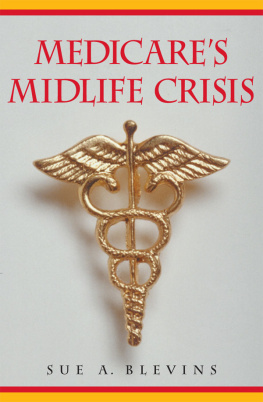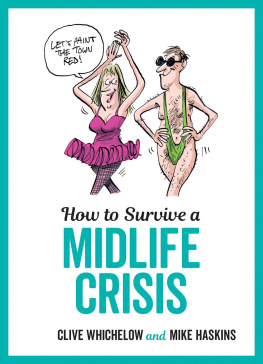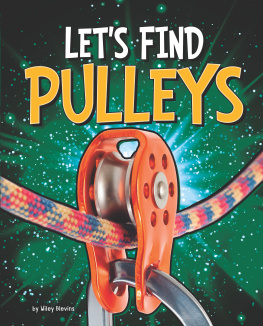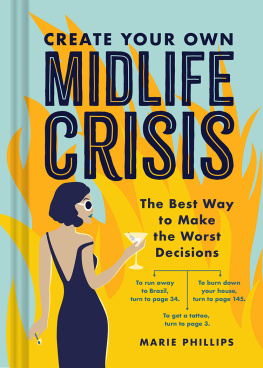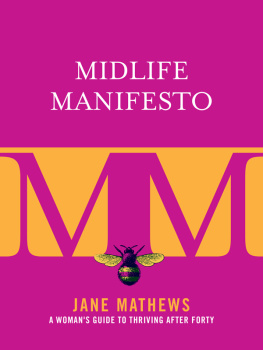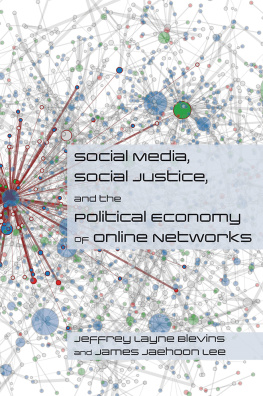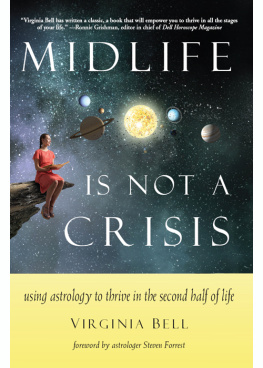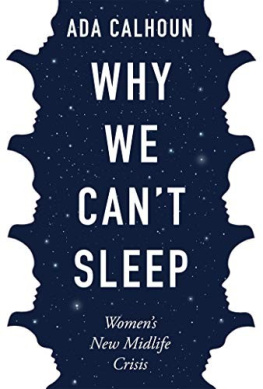
SUE A. BLEVINS
Washington, D.C.
Copyright 2001 by Suzie (Sue) A. Blevins.
All rights reserved.
Library of Congress Cataloging-in-Publication Data
Blevins, Sue A.
Medicares midlife crisis / Sue A. Blevins.
p. cm.
Includes bibliographical references and index.
ISBN 1-930865-08-2 --ISBN 1-930865-09-0 (pbk.)
1. Medicare--History. I. Title.
RA412.3 .B56 2001
368.42600973--dc21
2001047325
Cover design by Amanda Elliott.
Printed in the United States of America.
CATO INSTITUTE
1000 Massachusetts Ave., N.W.
Washington, D.C. 20001
Acknowledgments
Understanding the complex and confusing Medicare program is a daunting task that has required an enormous amount of research and analysis. I am most grateful for my educational experiences at two of the nations leading universities, the Johns Hopkins University School of Nursing and the Harvard School of Public Health. Faculty at those institutions provided me with the research skills, leadership ability, and confidence to challenge commonly held beliefs. Even those professors who may not have agreed with my philosophical beliefs of limited government and individual liberty nevertheless served well as mentors.
For the opportunity to learn about seniors health care, I am grateful to the many patients to whom I provided nursing services in various settings, including nursing home, hospital, and home environments. I would like to thank the nurses, physicians, and health care executives who trained me in those settings both in the United States and in Canada. The experience and insiders perspective have been invaluable in understanding Medicares impact on seniors.
I am grateful to the Institute for Humane Studies at George Mason University for its financial support. In 1997, I was awarded a Social Change Research grant to study the history of Medicare, its development, and its effects. This permitted me to discover important information not widely disseminated.
Many people encouraged me to write this book and assisted with its organization and development. In particular, Alice J. Rini, Associate Professor of Nursing at Northern Kentucky University, spent time during a sabbatical to help me investigate past and current Medicare issues. She contributed to the sections of the book regarding Medicare financing for physician education and prescription drug coverage. She also reviewed drafts and provided insightful comments. Naomi Lopez Bauman, director of the Center for Enterprise and Opportunity at the Pacific Research Institute for Public Policy, provided intellectual inspiration.
To Debbie Grady, I am most grateful for her excellent research skills and dedication. She discovered an extremely useful bibliography of newspaper articles covering Medicare during the 1960s. She helped compile and organize information from existing books and articles on Medicare. Jennifer Rogers and Arlo Pignotti also provided valuable assistance with locating and compiling historical documents. Christopher Middleton provided insightful comments on actuarial data. They all helped tremendously checking facts and proofreading.
I am grateful to Sheldon Richman, editor of Ideas on Liberty, for his editorial assistance and important feedback on the manuscript. Sheldon encouraged me to examine how American families used to rely on sickness insurance, which paid lump sums of cash when they became ill. This idea was extremely appealing as it meant individuals controlled their own money for health care.
Tom Miller, director of health policy studies at the Cato Institute, dedicated a significant amount of time reviewing drafts, making recommendations for timely updates, and obtaining comments from expert reviewers. Toms significant recommendations contributed greatly to the empirical evidence referenced throughout the book.
To the many reviewerscolleagues, advisors, and friendsI am thankful for their insights and comments on the many revisions of the manuscript. Scot Plank; Robin Kaigh, Esq.; and Ed Hudgins, director of regulatory studies at the Cato Institute, were especially helpful.
Finally, I am extremely grateful for the freedom of speech that exists in the United States of America. Without this precious liberty, I wouldnt be able to reveal many unknown facts about Medicarethe largest single payer of health care in the United States. Those facts supply readers with the strongest reasons for heeding the message of this book.
Preface
If you pay taxes, sooner or later your life will be changed by Medicare. When you turn 65, you will have to enroll in Medicares hospital insurance program or lose the Social Security benefits promised to you during your working life. Once enrolled, youll be subjected to thousands of pages of Medicare rules and regulations dictating what types of health care are covered and what are not, how long you can stay in the hospital, and whether or not you can receive home care services. If you happen to require home care following a hospital stay, youll be forced to share psychological, sexual, and financial information with the federal government as part of Medicares new home-monitoring data collection system.
These and many other facts are not well known about Medicareone of the worlds largest medical programs, which spent more than $221 billion in 2000 and is expected to require $645 billion in federal general revenue subsidies over the next decade (between 2002 and 2011).1 A Kaiser Family Foundation/Harvard School of Public Health poll found that 63 percent of seniors know only a little or nothing about Medicare and efforts to reform it. Seventy-nine percent of individuals under age 65 also admit to knowing very little or nothing about Medicare and the current policy debate.2
In addition, many Americans dont know that the program was created as part of a larger plan to create a government-financed national health care system. Incremental steps were taken in 1965 toward that goal, including the establishment of Medicare Part A, Medicare Part B, and Medicaid, the government program for lowincome individuals of all ages.
This book explains how Medicare came about, and clarifies why Congress created three separate government health programs in the 1960s. Most important, it gives the reader an overview of how Medicare affects his or her life today and how it could do so 30 years from now. Using government studies, congressional testimony, academic journals, and other sources, I have compiled important facts and analyses that would be hard to find in any single place. Finally, this book provides guiding principles for helping Americans gain greater control over their own health care, and hopefully tax dollars, too. Whether youre already retired or still working, this book will provide you with a greater understanding of Medicare.
The book is organized into six chapters: Chapter One introduces the reader to Medicare and provides a broad overview of the program, including the current economic outlook. Chapter Two examines the historical debate and early efforts to implement compulsory health insurance in the United States. Chapter Three discusses Medicares passage and early evolution, examining the political climate during the early 1960s. Chapter Four explores the important issue of whether government officials concealed the true costs of Medicare when the program was being debated in the 1960s. Chapter Five examines Medicares impact on seniors life expectancy, poverty rates, and health care costs since the program was enacted in 1965. Finally, chapter Six discusses key concepts to consider for Medicare reform. The purpose of this book is not to provide a detailed plan for reforming the Medicare program, but rather to explain how we have reached this critical point and outline basic principles for dealing with Medicares midlife crisis.




